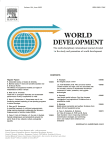
Contested water- and miningscapes: explaining the high intensity of water and mining conflicts in a meta-study
Schoderer, Mirja / Marlen OttExterne Publikationen (154)
in: World Development (154), article 105888
DOI: https://doi.org/10.1016/j.worlddev.2022.105888
Open access
Conflicts around access to, control over, and quality of water accompany mining projects all over the globe. Often, they are associated with high intensity as means of contestation range from verbal complaints to protest marches, civil disobedience and violent confrontations. While numerous case studies on water-related mining conflicts exist, scholarship that synthesizes insights remains rare. In order to better understand the dynamics that lead to the escalation of conflicts and to further theory development on the role of, e.g., political economic contexts, hydro-social conditions and social relationships, a systematic overview of the existing empirical evidence is needed. Our meta-study of 53 water and mining conflicts identifies several combinations of conditions that are tied to large-scale mobilization and the use of civil disobedience measures, sabotage or hunger strikes by environmental defenders. As our results show, raised stakes and ontological differences, e.g. in situations where water is essential for livelihoods and cultural and spiritual practices, play a role, in particular when coupled with a lack of meaningful participation. Discursive or physical coercion by the state or by private security forces also intensify mobilization rather than containing it while the role of international NGOs is more ambiguous. To identify explanatory scenarios, we conducted a two-step, fuzzy-set qualitative comparative analysis (fsQCA) based on data collected in a systematic literature review of peer-reviewed articles and book chapters. Taking its data from published research, our study identifies a geographic bias towards Latin America in academic literature on water and mining conflicts and points out topical blind spots. By looking for conditions that are consistently associated with high-intensity conflicts, it also provides insights on priority areas of engagement for community leaders, policy-makers, and private sector and civil society representatives seeking to avoid the escalation of conflicts.

